Well friends, sometimes the universe just delivers some good news. This news came as a sort of “Yes, Park Junkie… there is a God” kinda moment…
Court filings in a Virginia Federal Court show that a class action lawsuit has been filed against multi-billion dollar corporate giant Booz Allen Hamilton, the government contractor responsible for the ever-so-lovely public land reservation portal, Rec.gov.
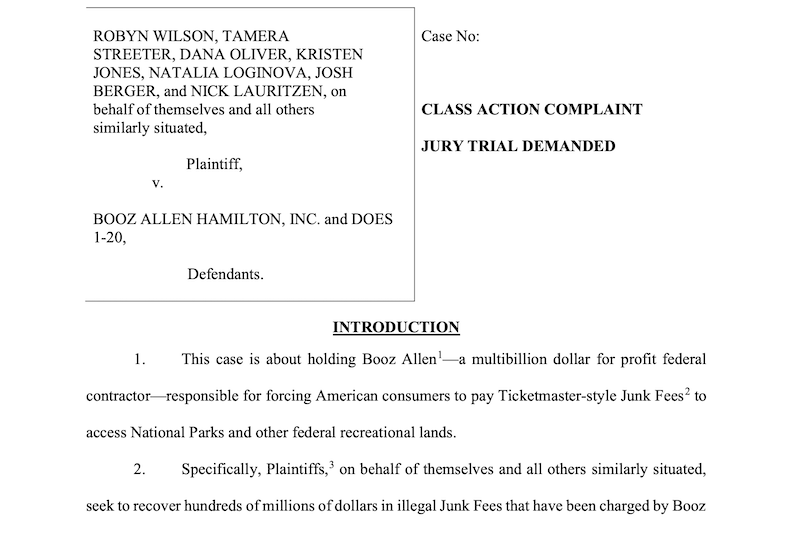
That’s right, Booz Allen is facing a lawsuit that alleges it is cluttered with unauthorized and possibly illegal “junk fees” that potentially generate hundreds of millions of dollars for BAH.
Wilson v. Booz Allen Hamilton
The lawsuit was brought by seven outdoor enthusiasts who are seeking to have the matter certified as a class-action suit, covering all individuals in the United States who were charged a Junk Fee on the Recreation.gov website and/or App.
Plaintiffs’ attorney, Wesley M. Griffith, said they are not challenging the use fees that go towards funding access to federal lands, but the transactional junk fees, which as he notes, are “paid 100 cents on the dollar” to Booz Allen.
The Rec.gov website and app provide a slickly designed platform for users to reserve campsites, float rivers, hike, cut down Christmas trees, and hell, damn near anything you can imagine short of naked fire dancing in the backcountry in the National Park System and other federal lands.
Actually, do they have naked fire dancing permits…? Perhaps I shouldn’t have deleted my account after all… Anyway…
The complaint alleges that Booz Allen’s fees are akin to the infamous fees Ticketmaster affixes on entertainment ticket purchases, which have in recent years surfaced in car rental agreements and hotel stays.
The Biden administration has dubbed such add-on charges as “junk fees”, and has suggested that they are serious about cracking down on companies who issue such unpleasant surprises to unsuspecting customers. No word from the White House on the matter of Booz Allen & Rec.gov yet.
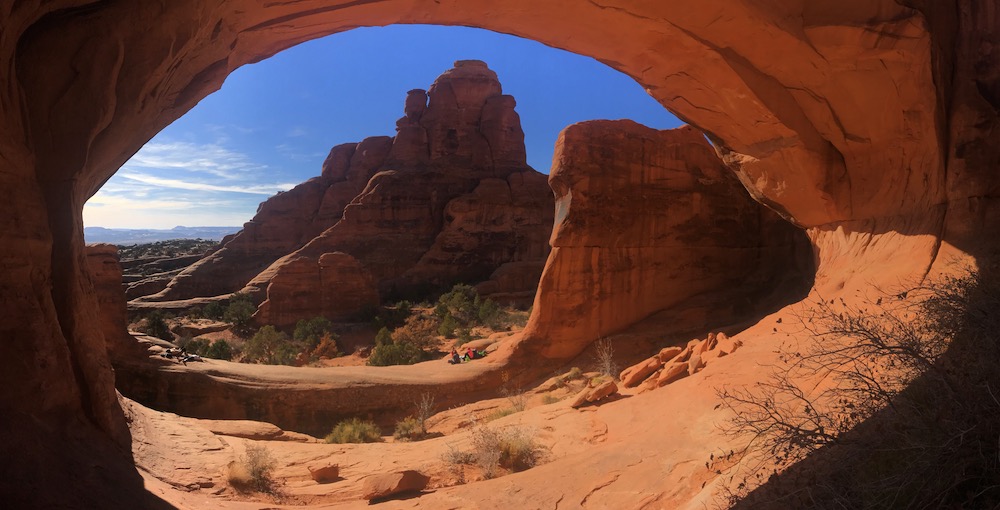
When asked whether it was looking into the Recreation.gov fee structure, the U.S. Consumer Financial Protection Bureau referred the question to the National Park Service, who oversees the Recreation.gov program. The NPS suggested that such answers may be found over at the U.S. Forest Service, who reportedly wasn’t keen on answering questions either.
While the lawsuit seeks to recover hundreds of millions of dollars in fees for those who use Recreation.gov, Booz Allen says the “allegations are grossly inaccurate and reflect a fundamental lack of understanding of Booz Allen’s work supporting the government.”
“Work supporting the government”? Sounds more like work supporting the corporate shareholders… which is, by the way, the goal of any corporation. It has to be. Actually, that’s the law.
How’d This Happen?
Way back in 2016, during the celebratory revelry surrounding the 100th anniversary of the National Park Service, Booz Allen signed a five-year contract with the U.S. Forest Service to manage the Recreation.gov portal for the federal government’s land management agencies, including the National Park Service.
According to Rick DeLappe, a program manager and apparent liaison between the NPS and BAH, contract extensions are based on performance, and awarded on a five year basis.
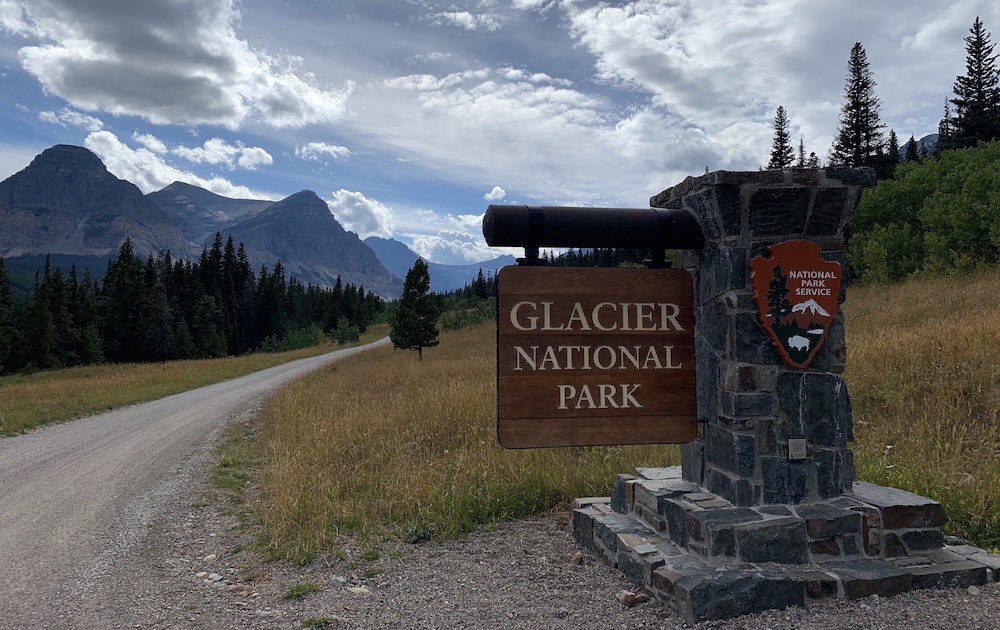
Booz Allen boasts of its “partnership” with the government: “Instead of a traditional cost structure, the unique contractual agreement is a transaction-based fee model that lets the government and Booz Allen share in risk, reward, results, and impacts. This is a true public-private partnership – it uses no government money,”
Although the folks at BAH claim that there is no government money involved in this arrangement, there is the issue of a $182 million contract that was signed by the Obama administration back in the good ‘ol days of 2016, before the onslaught of reservation requirements, Covid park closures and traffic cameras in the Great Smoky Mountains.
Oh, and Park Junkies certainly should be aware that in 2021, the Forest Service requested an additional $120 million for an “interagency funded contract” to support “reservations for all recreation facilities on public lands that allow reservations”.
Where did this $120 million go? Well Dude, we just don’t know…
Because the U.S. Forest Service isn’t talking.
The Federal Lands Recreation Enhancement Act
The Federal Lands Recreation Enhancement Act authorizes five agencies – National Park Service, Bureau of Land Management, Bureau of Reclamation, Fish and Wildlife Service, and the Forest Service – to collect specific fees for on-site improvements.
As we’ve discussed in previous writings, this act was ostensibly passed to allow federal land management agencies to charge fees for the use of certain public lands in order to facilitate the improvement of infrastructure on park lands.
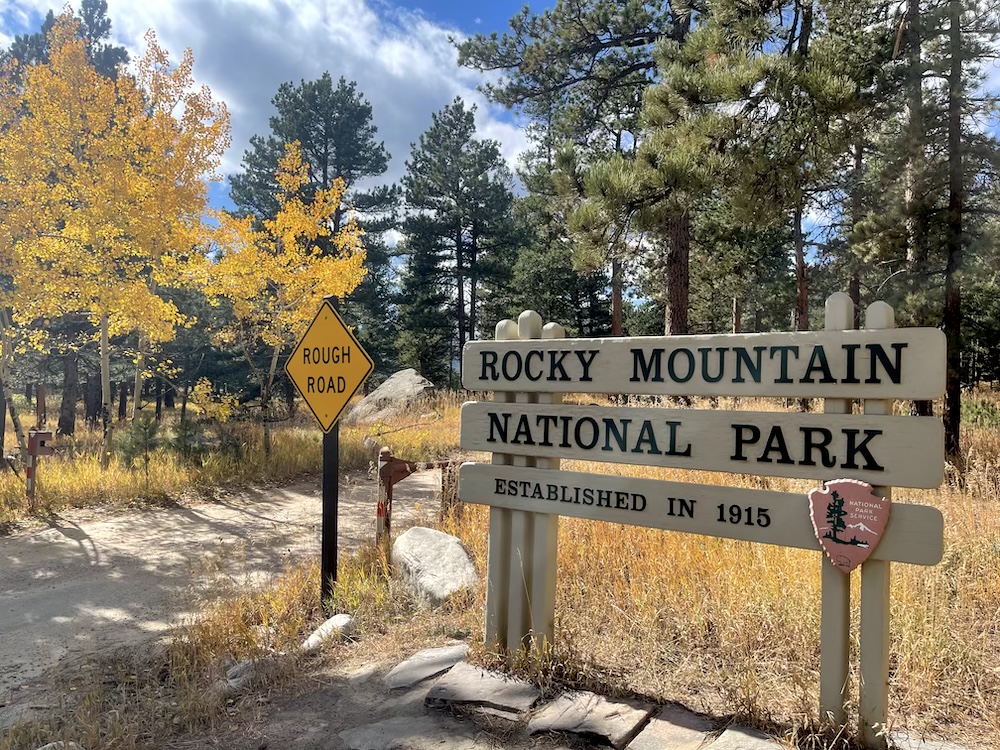
Unfortunately, the FLREA became the back door, through which the monster of Rec.gov quickly gobbled up campgrounds, trails, rivers, backcountry campsites and national park entrances as if it were playing a Parker Brothers game with a name that rhymes with Monopoly.
Oh, well maybe it was Monopoly…
Kotab v. Bureau of Land Management
Key to the plaintiff’s case is whether the fees are allowed under the FLREA, which specifically lists fees that can be collected at National Park Service, Bureau of Land Management, U.S. Forest Service, U.S. Fish and Wildlife Service, and U.S. Bureau of Reclamation sites and denotes how they are to be spent.
In the 2022 case of Kotab v. BLM, a Judge Jennifer A. Dorsey, a U.S. District Judge in Nevada, ruled that a “processing fee” charged by Recreation.gov to access the Red Rock Canyon, was improperly administered because the public hadn’t been given an opportunity to review and comment on the fees when they were proposed, as required under FLREA.
You see, the FLREA allows fees, but most access fees must be publicly announced in advance, and the land management areas must offer the public a “comment period” during which concerned citizens can provide their thoughts on the matter.
The BLM failed to offer this comment period in Red Rock Canyon, and Kotab went after them. He won… But it didn’t matter…
As Matt Stoller reveals in his November article “Why is Booz Allen Renting Us Back Our National Parks”, despite the ruling, the BLM and Booz simply assembled a phony advisory council which “reviews” public input, then simply does whatever they like… & apparently, they like charging fees.
Privatization of Public Lands
It will indeed by interesting to watch this case roll forward, as it is not yet clear what the outcome of the lawsuit will be or how it will impact the future of Recreation.gov. But it does open the door to many questions about the future of public land management.
Many, including Park Junkie himself, suspect that the implementation of these reservation systems is simply a step in the move toward the privatization of the access to public lands. And if access to the lands is privatized, then the land itself may just as well be privatized.
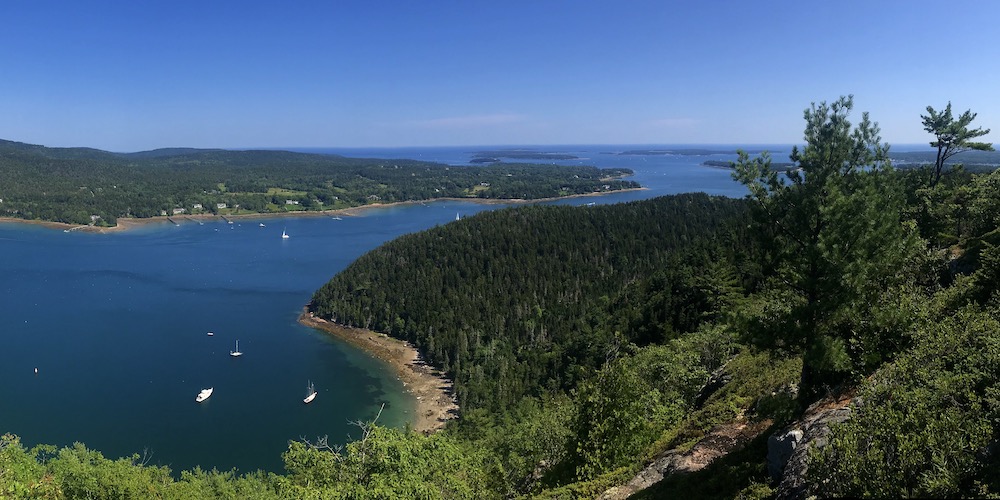
Critics, such as I, argue that outsourcing the management of these resources to private companies can lead to a number of problems, including reduced public access, increased fees, and conflicts of interest, not to mention the erosion of public trust in once revered agencies, such as the National Park Service.
One of the main arguments in favor of privatization is that it can help to reduce costs and improve efficiency. However, this may come at the expense of public oversight and accountability, and ultimately, as is clearly demonstrated in this case, public access itself!
When private companies are given control over public land access, they will inherently be more interested in maximizing profits than in protecting the environment or ensuring unencumbered public access. In fact, with corporate profits at the core of the corporate mission statement, there is simply no way around this unfortunate fact.
Another concern is that private companies may be more susceptible to conflicts of interest. For example, if a company is responsible for both managing and profiting from a public resource, it will likely be tempted to prioritize its own financial interests over the interests of the public.
In this case, the influence of Booz Allen on Washington bureaucrats will likely come into question, which will undoubtedly be entertaining. Some in the viewing gallery will undoubtedly be of the opinion that Booz Allen used its Washington heavyweight status as a means by which it acquired this contract.
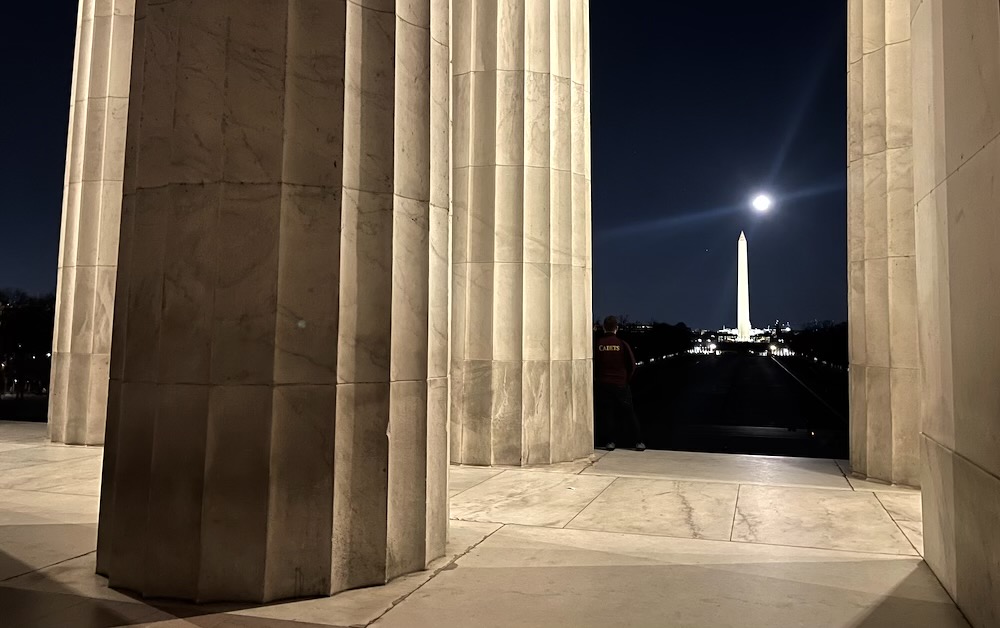
Further, we mustn’t ignore the possibly that this multi-billion dollar corporation (95% of their business is reported to be held in government contracts) is influencing numerous public land management agencies to adopt the Rec.gov reservation system, in an attempt to multiply corporate profits.
As Park Junkie has reported in past episodes, there are simply no explanations for why certain parks, such as the little-visited Congaree National Park, would adopt this reservation system, as they have been losing money on the arrangement, by their own admission.
Role of Government Contractors
Government contractors play a significant role in the management of public lands. These companies are responsible for everything from maintenance and repair to visitor services and recreation management. There is certainly a place for private enterprise within the confines of public lands. Indeed, it is unlikely that you really want a Park Ranger mixing your margarita, stirring your dirty martini or recommending a proper vintage cabernet to accompany your filet mignon.
However, the use of government contractors has been a source of controversy in recent years. Critics argue that these companies may not have the same level of accountability and transparency as government agencies, and that they may be more focused on profits than on public service. Some may contest this assertion, but they’d probably be a corporate attorney or lobbyist.
In the case of Recreation.gov, Booz Allen Hamilton is responsible for managing the website and mobile app that allow visitors to reserve campsites, float rivers, and access backcountry areas on federal lands.
It seems entirely likely, that the folks over at BAH, who obviously have the ear of anyone in Washington’s alphabet agencies, can easily influence the decision of federal land management officials to move their reservation systems to Rec.gov.
While the company says that it is operating under a “true public-private partnership” that uses no government money, the lawsuit alleges that it is generating hundreds of millions of dollars in revenue through unauthorized fees, and seeks to return those fees to Americans who have been scammed by this arrangement.
However, it must be admitted that no one yet appears to have intimate knowledge of the true amount of money collected by BAH from its public land reservation side-hustle. No one who’s talking anyway…
Park Junkie YouTube Videos on The Subject
Watch Park Junkie break down the legal complaint
